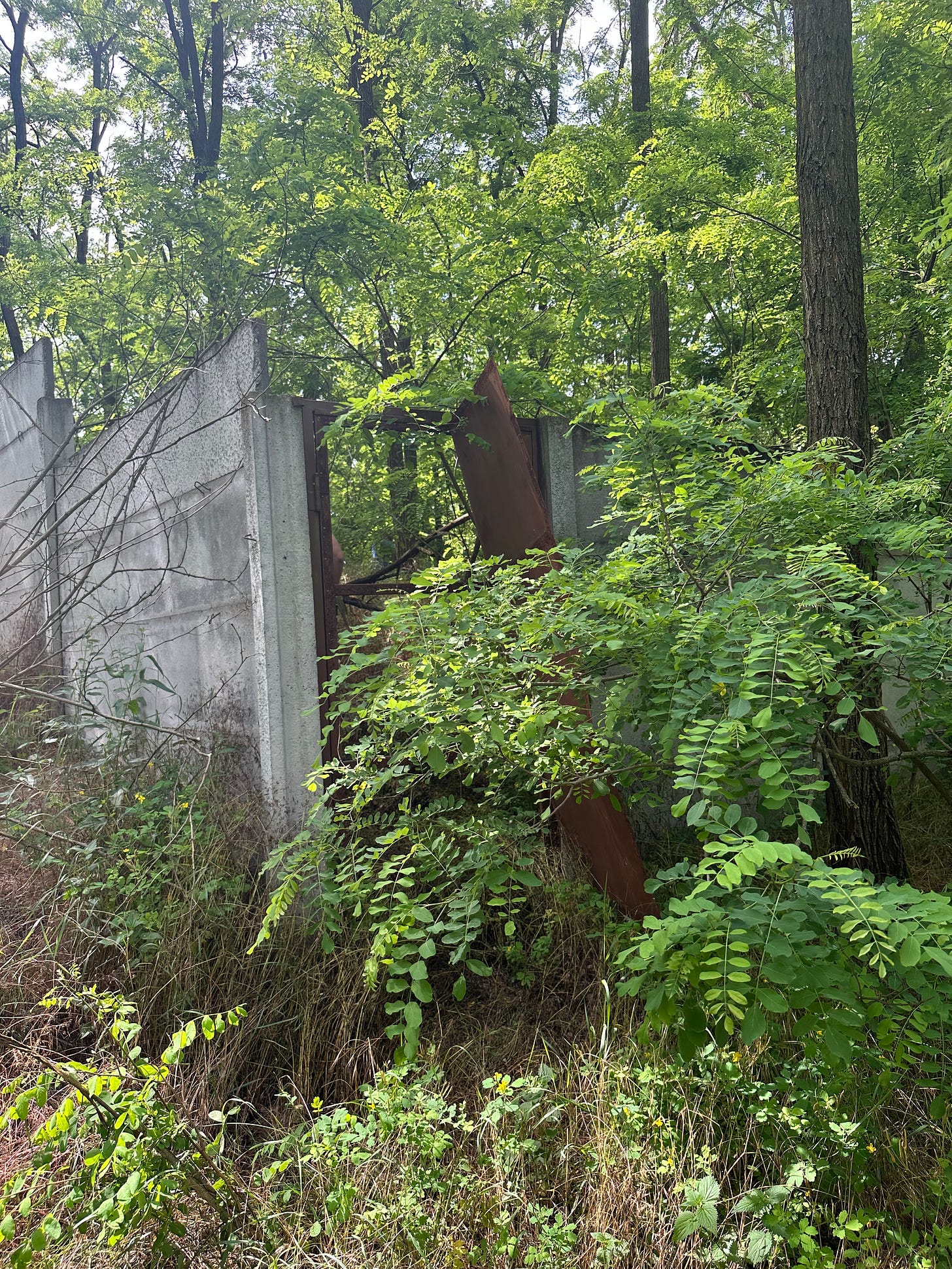Napkor and the "not normal" cemetery
While looking for my grandmother's village, I took a detour and came face to face with a crime no one bothered to remedy or cover up
We went to Napkor on a whim. It wasn’t part of the original itinerary but Karesz, our Hungarian interpreter and guide, insisted we stop by after learning it was where my grandfather came from.
This was a trip about my grandmother, but I started feeling guilty that I knew almost nothing my grandfather’s life before I entered it. I knew he and his family were Orthodox Jews. They were Kohns, of the priestly tribe, and they took their role very seriously.
I knew he was forced into slave labour during the war but until this trip I didn’t know what that meant. Karesz tells me that the Hungarian armed forces had units for “unreliable people” — Jews, gays, Jehovah’s witnesses and used them in forced labour battalions during World War II. They were not given weapons, but many were sent to the Eastern Front. A lot were captured. Few survived.
I also knew that he loved my grandmother from the time they were kids and constantly told me I was “just like her.” I know she refused his proposals many times because he “drank and smoked and gambled.” As I grew older, those descriptors just endeared me to him more.
By the time I came into the picture, he was an old man who still “drank and smoke” and possibly gambled. I considered him a holy man, who seemed to understand more of the world than he let on and if you looked at him straight in the face, his blue eyes could easily penetrate your soul.
One time, I walked in on him and my grandmother kissing on the sofa. I tried to make a quiet exit but they heard me. It still makes me smile, two Orthodox Jews, married for dozens of years, having survived the Holocaust, the 1956 Hungarian revolution, moving to Canada as refugees without a dime, making out on a couch. It gives me hope.
Napkor is located in Szabolcs-Szatmar-Bereg county, in the Northern Great Plain region of Eastern Hungary, about a 15-minute drive from the big city of Nyíregyháza. According to a 2105 census, 3664 people lived in the village, more than four times the population of my grandmother’s village, Beregdaroc, about 60 km away.
Inside the government building, Karesz asked if it would be possible to look up my family in the registrar, which are medieval looking books with handwritten information about births, and deaths, going back hundreds of years. No photos are allowed of the books. I couldn’t follow the conversation, but the government officials looked a me a few times before looking away. My son was with me, as was my boyfriend Isac, a striking(ly handsome) Black man with braids. I imagine we were all hard to miss.
Karesz came prepared with paper and a pencil. Even if I could follow the conversation, there’s no way I could have taken notes. My body couldn’t react fast enough. Just sitting there, in the room, in the building that has stood as the administrative building for likely a couple hundred years, put me in a mild state of shock. This is where decisions were made; this is where people’s lives were determined. My grandfather’s. His family’s. Friends. Relatives. Neighbours.
The names started flowing through Karesz’s script — and there were so many of them. His mother’s name was Cecil Buchsbaum; his father’s Marton Kohn. He had a brother who died in 1909 at age 13 months. His name was Mikolosh. An entire family of first cousins. On person was listed as blind and deaf. Another was a shoemaker. My mind struggled to absorb all this new information. All their birth dates, with witnesses, meticulously written by hand into this leather-bound book.
“You had lots of family here,” Karesz says to me.
“Where are they?” I reply, knowing the answer. “Can we see the cemetery?”
Karesz asks them in Hungarian. The administrator pauses and calls in a man in the hallway. They engage in a serious discussion that I can’t follow. Karesz listens in.
“We will need to follow them in our car,” he explains.
We wait outside the government building in the June heat as one of the men goes to fetch his car. A couple of boys ride by on their bike. “Gypsies,” Karesz tells us, insisting that the descriptor isn’t considered offensive in Hungary and I don’t know enough on the subject to disagree. They slow down and stare at Isac, ooh-ing and ahh-ing over his cornrows and fashionable clothes. Isac smiles and nods. As they ride away, one tells the other in disbelief that Isac is “even darker than we are,” and I realize how little has likely changed in the last many decades.
The four of us crowd into our rented car and follow the two men in their jeep, down the main gravel road to a fork, where we turn off onto a dirt path. In a moment, we are covered with trees, their branches smacking the car’s windows as we slowly pass through in the mud. My mind briefly remembers I paid extra insurance in case of damage but the thought is fleeting when I hear the sound of a gun being shot. And then another one.
“It’s a recording,” Karesz tells me, but I sense irritation in his voice. We are passing by farms and the sound scares away predatory birds. Later I’ll look up the mallard and pheasant hunting that remains popular in the village and find a website showing a neat graveyard of hundreds of bird corpses. For now, the sound of shooting in the forest while following villagers who know we are Jewish only raises my anxiety.
“Where are they taking us? The last time my people followed government officials into the backwoods it didn’t end well for us.” I tried to joke. No one laughed.
Eventually, we end up at a walled enclave in the middle of nowhere, a cemetery surrounded by concrete and steel. How people travelled here in the years before the war, carrying their dead, I have no idea. But it was clear, even in the hundreds of years before the war, that my family wasn’t terribly welcome in the vicinity. Even our dead served as an inconvenient memory
.
The steel door had at one point been busted open and then haphazardly fixed. Weeds and trees grew everywhere, and I carefully watched my footing so as not to trip. I scanned the area looking for stones and remembered that Kohns (or Kohens) are not allowed to visit cemeteries or be near dead bodies, unless they are burying their closest relatives. My family took that edict very seriously. My uncle didn’t enter the funeral home when his own father, my grandfather, died. Their dead, if they were here, would likely be buried together, near the outskirts, so that family members could wait just outside the cemetery without breaking the rules.
I walked through the steel doors and there was a moment of peace among the trees, a homecoming of sorts. I carefully manoeuvred through the overgrown weeds and shrubs in Karesz’s direction but he was already turning back towards me, walking at a brisk pace.
“Don’t come closer,” Karesz yelled, and my heart sank, briefly worried we were in danger, and I had foolishly brought my son.
“Why?” I asked, the muscles in my shoulders on high alert. “What did you see.”
“That’s it, there’s nothing here. Nothing.” Every last tombstone had been stripped from the graveyard. I imagined the bones under the ground, my family’s bones, somewhere among the trees. I wanted to wait, to stay awhile and linger with their spirits. But it was clear from Karesz’s tone that we needed to leave as soon as possible.
I never asked him if the reason he wanted to leave so quickly stemmed from his concern over further desecrating the graves or his discomfort of us being alone, in the woods, with descendants of people likely complicit in a genocide. It didn’t matter. I followed his lead, even if part of me wasn’t ready to go. Not just yet. This was a piece of the puzzle, and I never did get any answers.
(Watch my very amateur video of entering the gravesite, taken on my iPhone.)
We returned to our cars and followed the two government workers back down the dirt road to the main one. When we made it safely through the trees, we paused. They got out of their car to say goodbye and we politely thanked them for the trouble and for their time. Money might have been exchanged, as a tip of sorts. They looked contrite, almost uncomfortable.
One asked Karesz in Hungarian if there’s a chance some of my family were not Jewish. If that’s the case, they can gladly take us to visit the “normal cemetery.”
“No,” I replied. “They were definitely not normal.” Thinking to myself that nothing about this will ever be normal.
Share the ❤️! It makes me feel good and helps others discover my work.
"You are Like the Dew"
My Bubbe tapes. These six cassette tapes have kept me company for the last 25 years. For years, I moved them delicately from one desk to the next. Sometimes they sat on my bedside table, in a neat pile. For a few years, I kept them in the small safe in my closet. The tapes were the only thing in the safe, other than my family’s passports — it was proof of the past and my documents to escape in the future, if and when necessary.
I gave my son his name to free him from the weight of the dead. I wonder if I went too far.
October 7 created a rift in the world, but it has also created one in my home. And I’m torn between supporting my son’s right to his own beliefs and the knowledge that he carries a name that almost immediately identifies him as Jewish.
Tattoo Jew
In my 20s, I got a tattoo to link myself to my grandmother and her Auschwitz tattoo. When I tried to remove it in my 40s, I realized it was too late. The ink had already left its mark on my son.










Not at all similar but it reminds me of the distress I saw my father in when we visited the graveyard in his belowed Wiborg. There were tombstones here and there but I am pretty sure we would hear "not a single left" if we would go there today. I'm pretty sure they have built a road there. Nothing would surprise me of those who conquer.
Beautiful and horrible and poignant. Thank you for bringing this journey to life and sharing it.